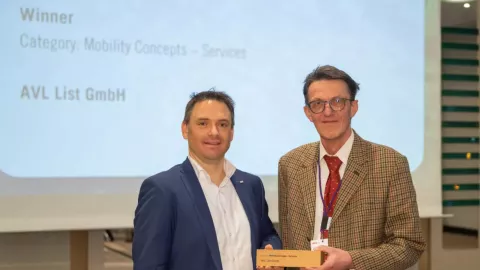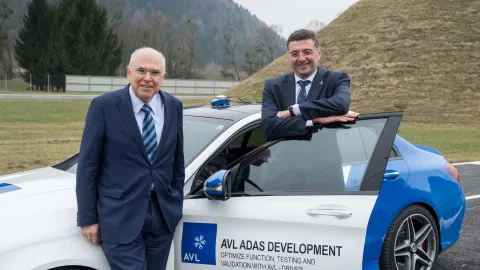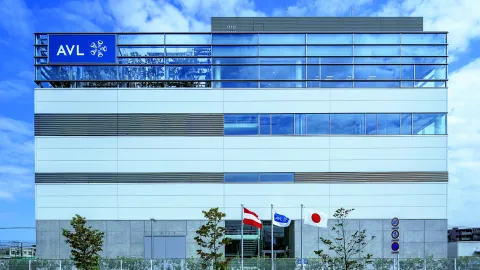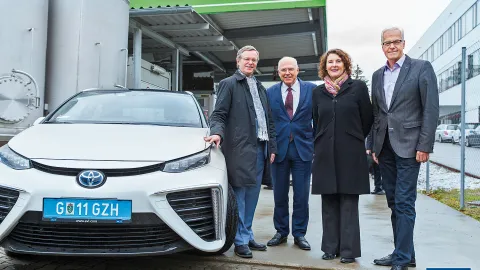Battery Passport for E-cars: AVL’s Sensor System for Greater Sustainability and Transparency

More than a million fully electric cars are currently driving down the streets of Germany. From 2026, the battery passport could make it possible to record how sustainable their drive system is over its entire lifecycle. The pilot project will propose standards to be applied throughout the EU. In AVL List’s “Battery Innovation Center”, it is already possible to precisely measure and optimize the carbon footprint of the production of batteries. Small sensors monitor every step, creating maximum transparency and reducing carbon dioxide by up to 30 percent.
Graz, Austria, 28th March 2023: The battery is the most important and expensive part in an electric car. How it is manufactured and recycled has a significant effect on the environment. The goal is to develop modern batteries that can be produced with minimal consumption of materials and energy. Instead of relying on estimates and random examinations, AVL is employing sensors that measure how much energy is used in every step of the process. The data are always up-to-date and accurately reflect the current situation. AVL then amalgamates the data and makes them available.
Trust is good, digital control is better
Martin Rothbart, Senior Product Manager Energy & Sustainability at AVL: “Up until now, figures from databases have mostly been used to calculate the footprint. With the rapid development of technology used in battery production, these figures are very soon obsolete, resulting in false results for the footprint. By using intelligent sensor systems, this can be avoided.” The data are amalgamated into a digital twin at AVL. This makes it possible to monitor energy consumption during ongoing production. Individual adjustments can be made during the production stage, thus optimizing the entire process. All information can then be processed, encrypted and incorporated in the battery passport, which is planned to be valid throughout the EU. To achieve this, AVL is working closely with Austrian start-up Tributech. Tributech specializes in the notarizing and distribution of data, so that everyone participating in the system has access to the data that is relevant to them at the right time. “In our information society, it is increasingly important to be able to fully trust data and their origin. Our blockchain-based data notarization helps ensure the necessary security between all parties involved," said Patrick Lamplmair, CTO and Director at Tributech.
Up to 30 percent less CO2 in the manufacturing stage
The method has the potential to reduce CO2 by up to 30 percent during production. However, efficient and proactive manufacturing also reduces costs. The “power of data” makes it possible to determine the current status and thus to plan ahead. “CO2 emissions when producing parts for batteries must be reduced as quickly as possible. Actual measurements during the production process help to achieve this. We can only improve what we can measure,” said Uwe Grebe, Executive Vice President at AVL.
With the “Battery passport - CO2 measurement in battery production”, AVL is making an important contribution to meeting the UN SDGs and recently received the Sustainability Award in Automotive 2023 from the ATZ/MTZ Group in Germany.
AVL is a world-leading technology company specialising in development, simulation and testing in the automotive industry and other sectors such as rail, marine and energy. Through extensive research, AVL delivers concepts, technology solutions, methodologies and development tools for sustainable, safe and advanced mobility and beyond.
AVL supports international partners and customers in sustainable and digital transformation, with a focus on electrification, software, AI and automation. AVL also supports companies in energy-intensive sectors on their way to green and efficient energy generation and supply.
For more information: www.avl.com
Tributech is the leading provider of cloud and on-premise based data orchestration and notarization solutions. Tributech’s tools empower worldwide organizations from mid-size businesses to the Fortune 500 to limit the risk of data tampering without reducing productivity. The company leverages blockchain verification to establish trust, control data integration, demonstrate compliance and allow flexible data utilization. By using a blockchain-based security level, Tributech makes enterprise-level data security and interoperability possible for everyone. The technology works as a data processor, which can be integrated in edge and embedded devices, heterogenous infrastructures, data platforms and data services, allowing data to be verified at any point throughout their lifecycle. Headquartered in Austria, Tributech operates worldwide with its network of worldwide partners.
![PR_AVL_CONCERTO_5_SANTORIN_MX2_Bild[2] PR_AVL_CONCERTO_5_SANTORIN_MX2_Bild[2]](/sites/default/files/styles/landscape_small/public/pressrelease/Company/PressReleases/Press%20Releases%202017/PR_AVL_CONCERTO_5_SANTORIN_MX2_Bild%5B2%5D_0.jpg.webp?itok=yFVZY0gr)
- EN,

- EN,

- EN,

- EN,
Stay up-to-date as a journalist with our latest press releases concerning company updates, research projects, our latest developments, and more.
Download our fact sheet to get a comprehensive overview about what we do as well as our latest company figures.